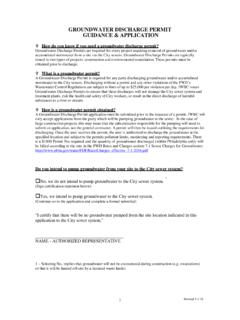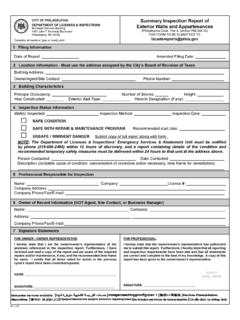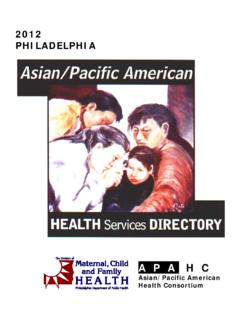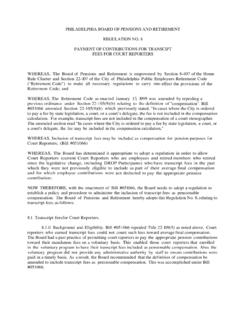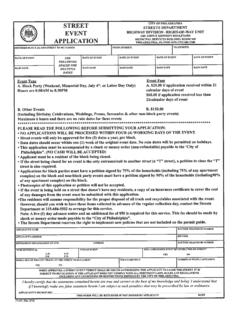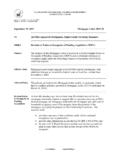Transcription of PARTNERS FOR GOOD HOUSING - Philadelphia
1 PARTNERS FOR good HOUSINGCity of PhiladelphiaDepartment of Licenses and InspectionsProduced by the Commissioner s Office2 The City of Philadelphia , on behalf of its citizens, has set minimum health, safety, and maintenance standards for houses and apartments. Keeping the HOUSING in our city up to these standards involves a partnership between tenant, landlord, and the City. All three must work together to provide decent HOUSING for information in this guidebook applies to Philadelphia , Pennsylvania and is based on the Code of General Ordinances of the City of Philadelphia particularly Title 4, the Building Construction and Occupancy for good HOUSING outlines the responsibilities of owners, tenants, and landlords for maintaining houses and apartments in a safe and clean information, including online access to this booklet in multiple languages, as well as access to the Building Construction and Occupancy Code (which includes the 2015 Philadelphia Property Maintenance Code), is available at the Department s website.
2 FOR good HOUSINGT hank you to the Department of Public Health and Environmental Health Services for your ongoing support and FROM THE COMMISSIONERI ntroduction ..2 General Requirements ..4 Fire Protection ..6 Basic Facility Requirements ..10 Keeping Homes, Apartments, and Yards Clean and Sanitary ..12 How the Building Construction and Occupancy Code is Enforced ..14 How to File a Complaint or an Appeal ..15 TABLE OF CONTENTS4 GENERAL REQUIREMENTSWHO NEEDS A rental LICENSE?The owner of any dwelling unit, multiple family dwelling, rooming house, dormitory, hotel, one-family dwelling, two-family dwelling, or rooming unit let for occupancy must obtain a rental License. For more information visit the City s website, , and see section 9-3900 of the Philadelphia Code. High-rise residential buildings, those with a floor 75 feet or more above the lowest level of fire department vehicle access, are also required to obtain an Annual High-rise rental LICENSEFor more information see section 9-3900 of the Philadelphia Code online at EXCEPTIONS: A rental License does not need to be obtained for an individual unit if one has been issued for the building in which that dwelling or rooming unit is located.
3 A rental License is not required if the property is occupied by an immediate family Lead Paint ResponsibilitiesAs of December 21, 2012, the Lead Paint Disclosure and Certification Law will require Philadelphia landlords to ensure that property rented to families with children six years and younger is lead safe when the following three conditions are met: 1. The property was built before 1978; and 2. There is a change of occupancy; and 3. Any new occupant is aged six years or lessBefore a lease is signed the landlord must provide the tenant with a current certificate indicating that the property has passed a visual inspection for deteriorated paint and has been cleared by lead-dust wipe samples or is free of any lead a Pennsylvania Licensed Inspector, Risk Assessor or EPA Certified Lead-Dust Sampling Technician can provide a copy of the certificate signed by the tenant, along with the dust wipe test results, must be sent to the Philadelphia Department of Public signing an application for a new or renewed rental license, property owners are now required to indicate they are in compliance with this law.
4 For more information, copies of the law, guidance for landlords, sample certificates, and more, go to: FROM THE COMMISSIONER2. COMMERCIAL ACTIVITY LICENSE (CAL)Formerly known as the Business Privilege License, this license is required of every person desiring to engage in any business in the City of Philadelphia . It is a lifetime license with a one-time fee and applies to all businesses owned by a person under one name. EXCEPTION: For a property with four or less rental units, where the owner lives on the premises, a Commercial Activity License is not BUSINESS TAX ACCOUNT NUMBERThis is a number assigned by the Philadelphia Revenue Department to identify tax accounts. One number applies for all licenses obtained by an individual. - The CAL and Business Tax Account Number are applied for using the same form.
5 Only one Commercial Activity License and one Business Tax Account Number are required of one individual, regardless of how many rental properties he or she owns. - In order to obtain the required license, property owners and landlords must be tax ZONING APPROVALA property must be properly zoned in order to operate as a dwelling for rent. Zoning approval is required even if the owner occupies one of the REQUIREMENTSEach time a dwelling unit is rented to a new tenant, the owner must give the tenant: I. A Certificate of rental Suitability issued by the Department no more than sixty (60) days prior to the start of tenancy. II. A copy of this booklet, PARTNERS for good HOUSING . III. The Certificate of rental Suitability, which must include the owner s attestation to the suitability of the dwelling unit.
6 (L+I will not issue a Certificate unless the owner has obtained all licenses required to rent the property.) IV. Any owner required to obtain a rental License must designate a Managing Agent who resides in the city or regularly attends a business office within the city. V. An owner that resides within the city may act as the Managing Agent. 6 GENERAL REQUIREMENTS In the City of Philadelphia , the Department of Licenses and Inspections is responsible for enforcing both the Property Maintenance Code and the Fire Code. The Philadelphia Fire Code, which is referenced in this booklet, is available to view online at the Department s website, Tenants, landlords, and homeowners each have the duty to keep hallways, stairways, fire escapes, and exits clear at all times.
7 Storage of any kind under stairways is prohibited unless the space is separated from the stair by fire-resistance-rated construction. Rubbish and garbage are not allowed to accumulate in any location inside a building, including basements, storage, electrical, mechanical or other equipment rooms. Rooms intended for trash storage must have sprinklers and be separated from the rest of the building by one-hour fire- resistance-rated construction. Rubbish, garbage or other materials shall not be stored or allowed to accumulate in stairways, passageways, aisles, doors, windows, fire escapes or other means of egress. Permitted amounts of paints and flammable liquids (including insecticides containing flammable materials) must be stored in a room separated from all other parts of the building by one-hour fire-resistance-rated construction.
8 At least one fire extinguisher with a minimum rating of 2-A:10-B:C and a tag attached indicating inspections and maintenance performed during the past 12 months, is required in the public corridors or stairwells at each floor level of unsprinklered buildings. In buildings of three stories or less and having a single stairway, one such extinguisher is allowed, provided it is placed approximately equidistant from all dwelling units in the an alternative, if there are concerns about vandalism, theft, etc., a 2-A:10-B:C fire extinguisher can be mounted in each dwelling unit in the building. Except for one- and two-family dwellings, lighting is required in common corridors, stairways, and the exit discharge (exterior) to provide a light level of one foot-candle at the floor.
9 This lighting must be on a circuit independent of any dwelling unit. In buildings that have more than one required exit, this lighting must have an emergency power source. In buildings that are required to have more than one exit (including fire escapes), exit signs are required to identify the means of egress from each floor. These signs are required to be illuminated at all times by both the normal and emergency power sources. In existing buildings that have more than one required exit stair, the stairs must be enclosed and separated from the corridor by fire-resistant construction. In non-high-rise buildings, doors in these exit or stair enclosures must be one-hour fire-rated self-closing doors or 1 -inch thick solid core wood self-closing doors. In buildings that have only one required exit, the doors from the apartments must be self-closing and one-hour fire-rated or 1 -inch solid core wood PROTECTION7 MESSAGE FROM THE COMMISSIONER1.
10 REQUIREMENTS FOR ONE- AND TWO-FAMILY DWELLINGSO wners of one- and two-family dwellings (including owner-occupied one-family dwellings) are required to install smoke alarms powered by the building s primary power or a non-removable (sealed) 10-year battery. Smoke alarms should be installed as follows: In buildings built prior to January, 1998, smoke alarm interconnection is not required between multiple alarms within a dwelling unit. A permit is not required to install non-removable, battery-powered alarms; however, renovations that cause the removal of wall or ceiling coverings may trigger additional code requirements. See the Philadelphia Building or Fire Code, section 907. Smoke alarms must be installed in the immediate vicinity of the bedrooms and on each story of the house, including basements.
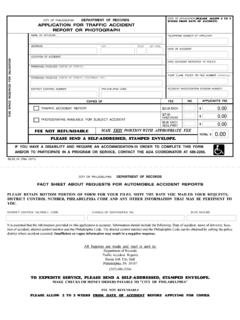
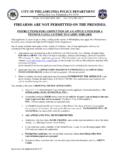
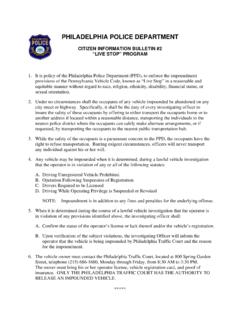
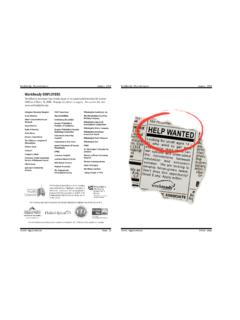
![[PSA] Philly: Classaction lawsuit brings changes in …](/cache/preview/1/4/c/8/8/d/5/c/thumb-14c88d5c5b2f1fee5e561fc7daceb397.jpg)
